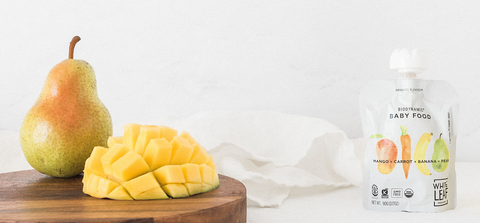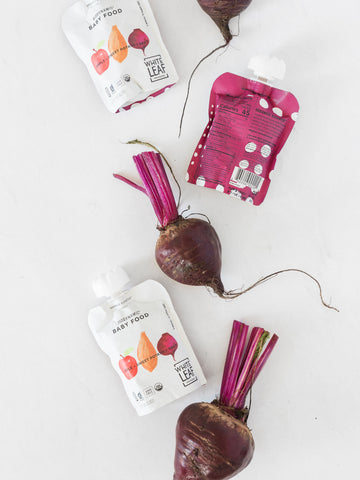Microbiome 101: How To Help Improve Your Family's Gut & Overall Health
When scientists or nutritionists talk about the human microbiome, they refer to a vast amount of tiny microorganisms that live on the surface and inside of the human body. These include countless types of bacteria, viruses and fungi. I admit, that sounds a little gross, doesn’t it? Especially in these days where we are so hyper-aware of disinfecting and sanitizing everything we touch.
However, a lot of these little guys have evolved alongside with us humans as a species and are not only helpful, but essential for our bodily functions. They live with us in a kind of symbiosis – a relationship that is beneficial for both the “resident” (the microorganism) and the “host” (us). It was only over the course of the last decade or so that the science world has taken a more in-depth look at our microbiome and the role is has for our health and well- being.

The Gut Microbiome: What It Is & How It Works
The gut microbiome – the microorganisms that live in our gastrointestinal tract – is the largest population compared to other parts of our body. Roughly 100 trillion bacteria live there, making up a couple of pounds or more of our overall body weight!
The gut microbiome’s purpose and responsibilities in our body are intricate. For example, there are tiny bacteria that help to digest certain carbohydrates, fiber, fats and proteins, which are essential for us but that we would not be able to absorb without their help. Their role in our digestive system may seem obvious, but we are only just beginning to understand how this affects our response to hunger and satiation, autoimmune diseases such as colitis and IBS, obesity, malnutrition and energy regulation.
The gut microbiome also has an important job when it comes to our metabolism, immune system and detoxification. While a lot of this is still in ongoing research, we know that our little sub-tenants synthesize and respond to metabolic products, hormones and neurotransmitters, and stimulate neurons that send signals directly to our brain.

Why Gut Health Is So Important
Knowing all this, it will come as less of a surprise that an imbalance in our gut microbiome can affect not only our digestive system but wreak havoc in a completely different part of our body! After observing animals with altered gut microbiomes in clinical studies, scientists concluded that the there is a connection to a wide range of neurological issues, ranging from anxiety, depression and insomnia to autism and Alzheimer’s disease, and even neurodegenerative diseases such as Arthritis.
For a long time the importance of the gut microbiome in our physical and psychological health was under-estimated. Now, with increasing awareness about the role that it plays for the human well-being, we have become more conscious of the impact that our life style in modern industrialized countries can have on the population of bacteria in our bodies.
Not just our diet, but also factors like c-section births, stress, a lack of physical activity and the use of antibiotics can have an impact on the balance and variety or microorganisms that colonize our gut.

The Healthy Population of our Microbiome Starts at Birth!
During a natural birth process, the baby, which has been in a sterile environment inside the mother’s womb, comes in contact with the bacteria inside the mother’s birth canal. With about one third of all babies being delivered vie Caesarean, the number of C-sections in the United States is higher than in many other countries, but factors like breastfeeding, delayed bathing and lots of skin-to-skin contact can help to expose a newborn to beneficial bacteria as well.
The environment we grow up in also contributes greatly to our microbiome. Since less families today are living on farms and in the countryside, fewer children are playing in the dirt or being around animals, in addition to an increased use of antibiotics, sanitizers and pesticides, the diversity of bacteria our children are exposed to has become more limited.
How To Help Improve Your Gut Health
It is never too late, though, to promote a balance of beneficial bacteria in your gut. As a grown-up, our nutrition plays a vital role in keeping our gut microbiome healthy. The right food choices can also help to restore gut bacteria when it has gotten out of balance, for example through a change in diet, stress, illness or medications such as antibiotics or chemotherapy.
Probiotics and “live” foods containing beneficial bacteria such as kefir, yogurt or fermented foods like kimchi or sauerkraut can improve the balance of bacteria in the gut. For reasons that are still not entirely known, however, most of the bacteria from probiotic supplements do not usually seem to settle in our gut to become “permanent residents”. They need to be consumed on a regular basis in order to have a lasting beneficial effect.
So it seems that the most efficient way to establish a balanced gut microbiome is from the ground up, on a basis of wholesome nutrition.

Key Nutrients to Eat More Of
Fiber is a key factor for a healthy gut population. Organic whole grains, brown rice, legumes, vegetables and potatoes are all great options. If you have previously had a diet low in fiber, increase your intake slowly so as not to overwhelm your digestive tract. The healthy bacteria need some time to grow!
Prebiotics are a type of indigestible fiber, and not to be confused with probiotics. They feed the beneficial bacteria in your gut and can be found in many grains, fruits and vegetables that are naturally rich in fiber, such as oats, barley, apples, bananas, asparagus, leeks and root vegetables.
Similarly to us humans, fruits and vegetables have their own microbiome. They are populated by bacteria, viruses and fungi that can become a source of microbes for our own gut when we eat them. Eating a diet rich in fruits and vegetables also provides a variety of phytonutrients – chemical compounds like polyphenols and other antioxidants that are important for our health and the health of our gut bacteria.
Why Regeneratively Farmed Ingredients Matter
Choosing organic and biodynamically grown produce can help to keep our microbiome balanced more effectively in several ways:
For plants, many phytonutrients act as natural insecticides, strengthening and protecting them, giving them a distinct taste or vibrant colors. In biodynamic farming, without the “help” of synthetic pesticides and fertilizers, plants tend to produce more of those free-radical-fighting antioxidants for their own protection. This makes them even more valuable and nutritious for us and helps in promoting the “good” microorganisms that live inside of us, while preventing the growth of ”bad” ones.
Just like antibiotics, pesticides and herbicides can kill the beneficial bacteria that live inside the soil and the plants that we eat. In a study done on apples, researchers found that organically grown apples contained a much wider variety of different microbial species than conventionally grown ones.
The complex little ecosystem within our bodies is delicate and susceptible to chemicals that are used in conventional agriculture, even if we consume only residual amounts of what is generally considered “safe” for human consumption.

You Can Do It!
Although the subject of the human microbiome is a relatively new area of research, it is not surprising that many people experience such a significant improvement in their health and well-being when making nutritional changes towards a healthy gut microbiome. Consuming a diet rich in fresh fruits and vegetables, whole grains and minimally processed foods, preferably from organic and biodynamic sources is a great place to start improving your gut health and overall quality of life while we are continuing to learn more about this exciting field of science.
* Disclaimer: this article is for informative purposes only and not intended to diagnose or treat any medical conditions. Please discuss any significant changes to your diet with your physician and consult with a doctor or nutritionist about personalized dietary advice if you have any health concerns*
